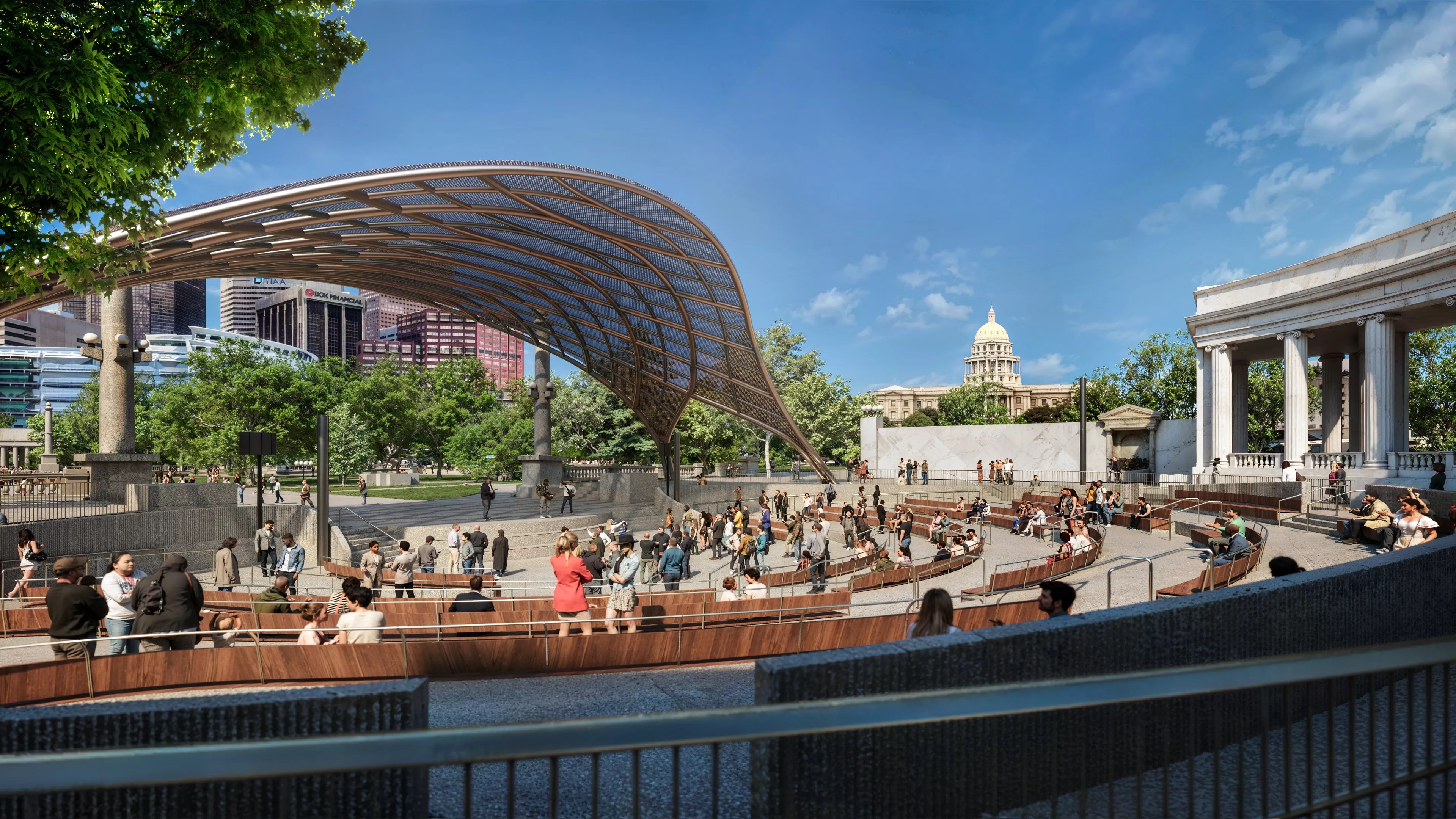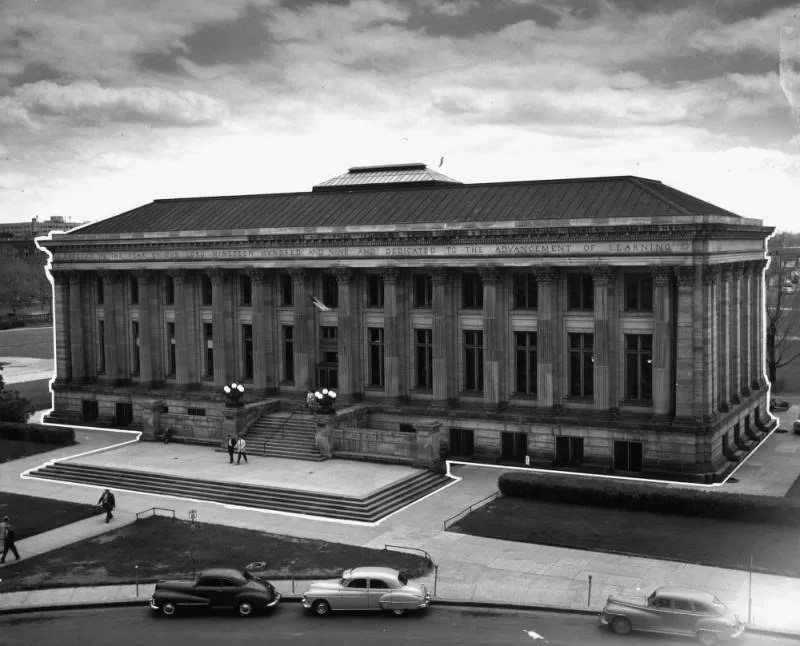
Civic Center Conservancy

Audio By Carbonatix
Denver’s Carnegie Library is about to start a new chapter.
The Greek Revival-style building has had a storied career since it was constructed in 1909 at the edge of what would become Civic Center Park, Mayor Robert Speer’s salute to the City Beautiful movement. When the city opened a new library a block away in 1956, the original served as various municipal offices – for the Denver Water Board, then the city treasury – and in 1999 was renamed the McNichols Civic Center Building in honor of former Governor Stephen McNichols (not his brother, former Mayor Bill McNichols). Then in 2012, after a renovation project that pulled down false ceilings and old plywood partitions, the building became an arts and events center – with occasional side stints as temporary housing for migrants and a bad-weather homeless shelter.
Ten weeks ago, McNichols hosted the unveiling of Denver Creates, an event introducing the city’s new arts plan by Arts & Venues that was long on feels but short on facts. “From our public art programs to our cultural investments and iconic landmarks, Denver is, and always will be, an arts town,” Johnston concluded at the announcement ceremony, which did include the revelation that the city would be “creating a downtown arts marketplace,” one that would include an artists-in-residence program and eventually event artist residences…but had no location.
Now it does.
Are we having funds yet?
On July 30, McNichols hosted another announcement ceremony: the reveal of the first round of ten projects – four devoted to business support, two to housing, one to redevelopment (the purchase of the parking lots by the Denver Pavilions) and three to public spaces – that will be funded by the Downtown Development Authority, which expects to distribute up to $570 million before it’s done. The DDA was created in 2008 to fund the renovation of Union Station into a multi-modal transportation facility, a project so successful that it was paid off in fifteen years rather than the projected thirty, making possible this DDA extension and expansion approved by voters in November 2024.
Johnston was on hand at this week’s announcement, too, and while the mayor admitted that “the city is facing challenging times” – with layoffs and other cuts imminent – the money for these ten projects and many more will not be coming from city coffers, but taxes collected within the district.
Like Denver Creates, this announcement was short on facts – largely because the DDA board had just approved the slate of projects a few minutes before the gathering was set to start, and the accompanying materials describing the ten projects had yet to be released (you can now see them here). The promised amounts start at $400,000 (for the Denver Immersive Repertory Theatre that was also touted at the Denver Creates announcement, when it had already received a $10,000 grant from the city despite being a Denver newcomer); anything over $500,00 must have the approval of Denver
City Council.

The McNichols Civic Center Building started as Denver’s Carnegie library.
Western History Library
Of that first $100 million, the biggest portion – $30 million – will go to a planned redo of Civic Center Park, the “end cap” of downtown, according to Johnston. Civic Center Conservancy will be working with Denver Parks & Recreation on finishing the Next 100 plan unveiled last fall, which calls for reversing the public stage area currently anchored by the Greek Amphitheatre, as well as focusing on new north-south pathways that will serve as more of a gateway to downtown.
Another $7 million will go to a reworking of McNichols.
Turns out, that “arts marketplace” will be located on the west side of McNichols’ first floor, with some artist studios, too; an RFP will soon be issued to create and operate that marketplace full of work by local creators. And on the other side of the first floor: a restaurant that will spill out onto the patio to the east of the building. This isn’t a new idea; it’s been floated since McNichols got a quick retrofit in order to host the first Bienniel in 2010. And while restaurant consultants have advised against it in the past, this time Denver Arts & Venues is moving full speed ahead, with plans for creating a full-service kitchen; it will soon issue an RFP for an operator.
The second floor is reserved for a museum. Last year, the city solicited interest in a possible museum there; soon an RFP will be issued for that project, too. The third floor will continue to be available for events, both public and private. And according to Gretchen Hollrah, the executive director of Arts & Venues, McNichols will no longer be used for emergency shelter; the city has come up with other options.
And once again, a suggestion…
At the announcement ceremony, DDA board chair Doug Tisdale offered this: “Here’s your headline: ‘The DDA is open for business.'”
But that’s burying the lede, at least for the biggest expenditure in this first package. Because once the Civic Center Park project starts – as early as September, according to the schedule released in October – Civic Center Park will be closed to everything. For at least a year.
That means that when Colorado is celebrating its 150th anniversary, its most historic civic gathering space will be closed to any celebrations. The last big events this year will be a series of raves. Already the Christkindl Market has moved its 2025 edition to the Auraria campus; Cinco de Mayo and the Outside Festival will have to find new homes in 2026, and 420 could go up in smoke altogether.
During this critical year, the “end cap” of downtown will be cut off from downtown.
That’s no way to have a party. People are tired of the endless construction in Denver; give them reason to celebrate. While the McNichols project can proceed, Denver should postpone the redo of Civic Center Park for a year.
The Next 100 plan was devised by Chicago-based Studio Gang, which also designed the dreaded Colorado 150 Pedestrian Walkway. If that birthday bridge can be scrapped, surely the Civic Center Park project can be pushed back a year in order to let the state celebrate. Council can do it when the $30 million DDA allotment comes up for approval.
Let the park be open for business in 2026. Let it host the big annual festivals, and maybe bring in a few more if that’s feasible. Bring back the People’s Fair, the Denver County Fair. Bring back the Taste of Colorado, too. After the state’s 150th, there will be plenty of time to wrap up the renovations.
In the meantime, Colorado’s capital city can party on.